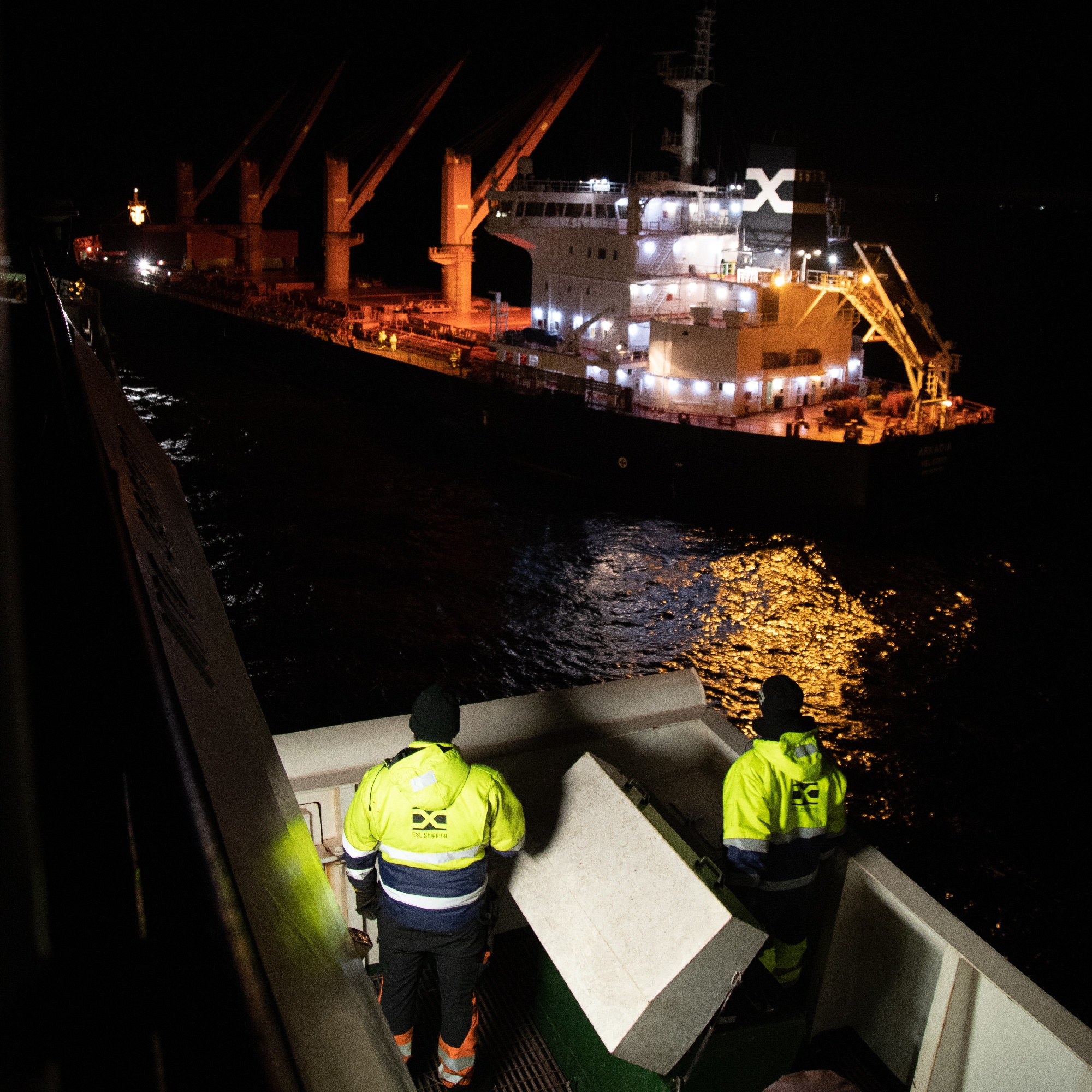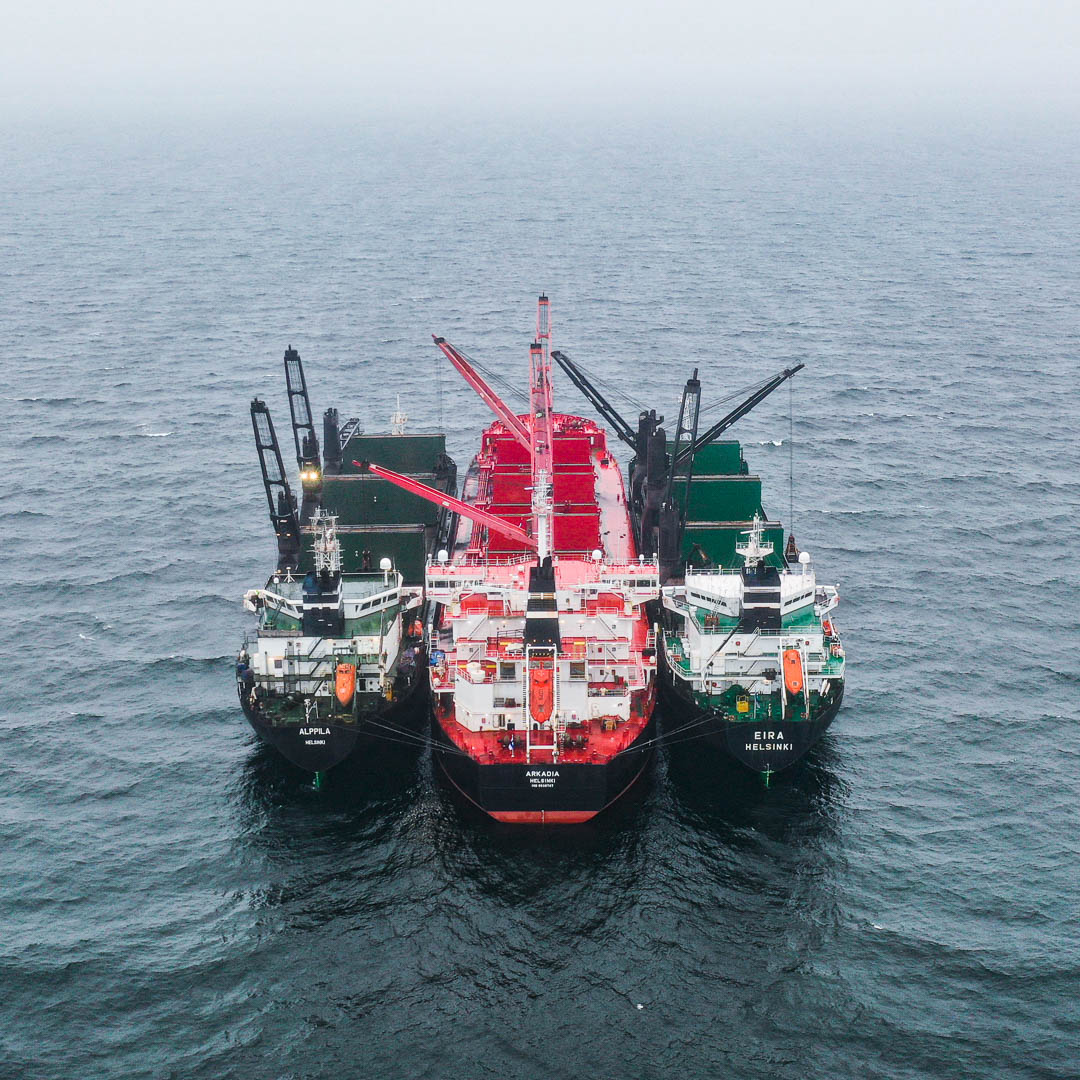Social responsibility
High level of employee satisfaction
One significant glass roof was broken in 2022, when the first female Captain took a helm of a ESL Shipping vessel. We hope that this important step serves as an inspiration to all other female seafarers.
The Covid pandemic has had a significant effect on the way work is conducted amongst the group. While before the pandemic most of the shore staff worked at the office every day, the hybrid work model is the new normal. A new hybrid work policy was launched to provide clear guidelines for employees who choose to partially work from home.
As employee health and safety remains the responsibility of employer even during remote work, new policies were established to improve the ergonomics for the home office. Employees have nowadays the possibility to request stand up desks, work chairs and extra screens which are loaned to the employee by the company. Regardless of the transition to more flexible working arrangements, employee satisfaction has remained high with ESL Shipping reaching AA-level (AA+ in 2021).
ESL Shipping and its subsidiaries treat its employees in a just and equal manner in all countries where it operates. The applicable local legislation, collective bargaining agreements and regulations are complied within all contracts of employment. These concern, among other things, working hours, remuneration, development opportunities, human rights and working conditions. We aim to improve the personnel’s engagement and wellbeing at work by promoting employees’ professional development at all organisational levels and by building an encouraging atmosphere.
The Group is committed to respecting internationally accepted human rights as defined in the Universal Declaration of Human Rights and the UN Guiding Principles on Business and Human Rights. Our Code of Conduct defines a common set for rules for the Group’s entire personnel. We reject any discrimination based on education, competence, position, personality, way of life, work experience, ethnic origin, religion, gender, sexual orientation, age, nationality, abilities or other qualities.
ESL Shipping’s vessels are an important part of the national education system providing opportunities for mandatory training for future seafarers. In 2022, 63 (86 in 2021) students were onboard ESL Shipping’s Finnish-flagged vessels for mandatory training. On average, each student spent 44 (37) days onboard, around a week longer than before the Covid pandemic.
Mobile intranet launched for seafarers
In late April, we launched a mobile intranet solution for our seafarers making it possible for them to access important information such as company news, announcements and HR information through a easy to use mobile interface. The response from the seafarers have been positive and the activation rate has remained over 80 percent.
In 2023, the intranet will be expanded to cover the vessels owned by AtoB@C Shipping. The project to renew the intranet for shore personnel was completed in the summer. In addition to the better functionality and updated content, the intranet is now accessible without using VPN connection producing a hassle free experience.
First female Captain appointed
When Captain Katariina Mankinen took helm of pusher Rautaruukki in March 2022, she became the first woman to be in command of a vessel in ESL Shipping's fleet. Seafaring is traditionally been a male dominant business and still today, only less than a tenth of our seafarers are female. Looking at all EU-flagged vessels, only two percent of seafarers are female. Ensuring the equal possibilities for everyone to advance one’s career within the company is one of the key elements for high employee satisfaction and retention rate.
On a larger scale, there is big generational shift ongoing as many long serving employees retire and the global demand for a competent crew increase. On a positive note, this an opportunity to promote young and hard-working personnel to new positions and ranks within the fleet.


Safety is our first priority
In 2022, the workplace safety indicators remained at the same level as in 2021 and all recorded incidents were classified as minor. As employee safety and wellbeing is paramount to us, the strong focus on the improvement of safety indicators will continue in 2023.
ESL Shipping and all of its vessels are certified in accordance with the requirements of the International Maritime Organisation’s International Safety Management (ISM) code which provides an international standard for the safe management and operation of ships and for pollution prevention.
ESL Shipping holds the Document of Compliance (DoC) from DNV issued under the authority of the Government of Finland, covering the vessels owned and managed by ESL Shipping. The vessels hold the Safety Management Certificate (SMC). The Document of Compliance is verified annually and the SMC every two and half years. The documents indicate compliance with the provisions of the ISM Code (Chapter IX of International Convention of the Safety of Life at Sea (SOLAS) 1974).
Vessels owned by ESL Shipping’s subsidiary AtoB@C Shipping sail under the Cyprus flag and are managed by our long-term partner GoTa Ship Management, who holds a document of compliance from Cypriot authorities.
Worktime incidents
Workplace safety is closely monitored at the group level. Two key metrics followed are Total Reported Incident rate (TRIR) and Lost Time Incident Frequency Rate (LTIFR). TRIR includes all incidents whereas LTIFR takes into account only accidents, which require absence from work.
The Total Reported Incident Rate (TRIR) in 2022 was 17.4 (16.6 in 2021) and LTIRF 3.5 (2.4). No severe injuries or other accidents were recorded in 2022. Three minor incidents required sick leave whereas the rest required first aid or light medical treatment. On a positive note, there were no long-term sick leaves caused by worktime accidents. ESL Shipping continues to focus on the development of preventive actions to decrease the risks and minimise the consequences of any incidents or accidents.
A good safety attitude, active identification of hazards and effective mitigation of the identified risks are the cornerstones to a comprehensive safety culture. Seafarers are encouraged to report possible safety hazards and encouraged to send proposals which improve onboard safety. Each ESL Shipping vessel has an occupational safety and health committee which covers the entire crew and meets four times a year.
ESL Shipping’s alcohol and drug policy is enforced through random testing and focused on testing of suspected breaches. During 2022, ESL Shipping discovered four incidents (one incident in 2021) where the shipping company’s substance abuse policy was violated. These incidents did not endanger maritime safety and the company handled these violations by taking appropriate measures as required by the company’s safety policy and collective agreements.
To ensure safety, ESL Shipping monitors any substance abuse by its employees through unannounced control tests. In 2022, these tests found one violation (none in 2021) which was handled according to company procedures and collective bargaining agreements.
Focus areas of safety in 2023
In 2023, a key focus of safety is to remove accidents, which could have been easily prevented, for example by using protective equipment correctly. To increase the understanding of the type of accidents onboard the company fleet, accident statistics from 2022 were discussed in a meeting with management level officers onboard vessels in January.
Onboard safety walks by the members of the management team will be introduced in 2023 with an aim to increase the common understanding of the importance of safe working practices. The aim of these initiatives is to improve the safety statistics and to bring the Total Incident Rate below 12 at the group level.
A more systematic approach to quality
Sharing and combining expertise between different segments improves the quality and safety performance.
The amount of external inspections have increased in the past year as customer requirements for the vessels used to carry their cargoes have become more stringent. As requirements between the inspection bodies are somewhat different, resources have been added shore side to support crew onboard to prepare for upcoming inspections.
One initiative to improve the performance has been sharing the Quality and Safety resources between ESL Shipping and AtoB@C Shipping. This change has enhanced performance on external inspections (vettings) as well as in fleetwide Port State Control statistics. In this respect, the outlook for 2023 seems positive.
In 2022, our Quality Superintendent performed 45 vessel inspections for both owned and chartered tonnage. Some of the inspections were pre-inspections to prepare the vessel and the crew for upcoming inspection, whilst the majority of the inspections were general safety and quality inspections. All the remarks and deficiencies are recorded to the reporting system where corrective actions can also be recorded for future evidence. All external vettings and audits for ESL Shipping-managed vessels resulted in no major findings.
During the year, the outline for the inspections was standardised by introducing the Responsible Shipping Initiative (RSI) questionnaire as a template for the inspections. In addition, mandatory audits of the Safety Management System were performed both onboard vessels and at the office.
In the course of the year, we have developed a more systematic way to monitor the performance of the time chartered vessels in Port State Control inspections performed by port state authorities. In doing so, we are able to compare different shipowners and better focus our inspections and efforts to the owners and vessels where performance can be improved.
Industry benchmarking with DryBMS standard
One of the initiatives to improve safety culture and vessel performance has been benchmarking ESL Shipping’s safety, security and environmental management system against industry best practices. Furthermore, the preparation of gap analysis based on Dry Bulk Management System (DryBMS) standards to identify and plan the most effective management upgrades required across the company to raise the bar to the next levels.
The DryBMS sets out 30 areas of management practice within four sections: Performance, People, Plant and Processes. Companies that improve in these four sections will deliver more safe, compliant and reliable operations, gaining a sustainable advantage over their competitors.
The review through 30 different modules of DryBMS was carried out during second half of 2022. As a general finding, our systems fulfil legal requirements, however the systems and data is slightly fragmented and there is a need to integrate manuals and procedures together for easier management to bring out potential efficiencies. The identified action points will be followed up through 2023.
High level of customer satisfaction
As a way to further improve our client experience, ESL Shipping and AtoB@C Shipping conducted their first client satisfaction survey in 2022. Going forward, the survey will be conducted regularly to provide an insight to the areas of improvement as well as where our clients see us performing well.
The results from the 2022 survey were very positive and the net promoter score was high at 57. Most of the positive comments were related to a high level of professionalism and the service attitude of both operations and chartering.
“Our aim is to provide tailor-made solutions for our clients’ sea transportation needs. Therefore, we were very pleased to see that many clients gave positive feedback for our solutions-oriented approach and the flexibility”, says Commercial Director Toni Rönnberg.



